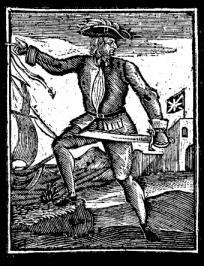18th-century
pirate constitutions
established democratic
governance for their roguish
commonwealths. Crewmembers
elected their captains by
popular vote and
democratically removed
captains who dared to misuse
their power. Because of this
surprising system, far from
tyrannical, the average
18th-century pirate captain
was a dutiful, elected
executor of his
constituents’ will.
Historical
pirates understood what
James Madison pointed out in
the Federalist Papers—that
the most important check on
leaders’ use of power is
society’s ability to select
them. But pirates recognized
this, and implemented it,
more than half a century
before Madison put pen to
paper.
(See:
http://news.ufl.edu/2006/06/28/pirates/)


